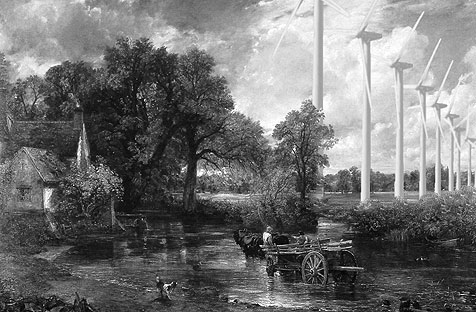
Genius & Common Sense
Genius & Common Sense – A Rare Commodity When It Come To Energy Policy
Two scenes from my middle-class childhood in England. In my home in Winchester, coming wet and cold into the nursery after the obligatory daily outing, I sit on the rug in front of the red glowing gas-stove and quickly get warm and dry. In the Albert Hall in London, in a posh seat in the front row of the balcony, I listen with my father to a concert and hear majestic music emerging out of yellow nothingness, seeing neither the orchestra nor the conductor, because the hall is filled with London‘s famous pea-soup fog. The gas-fire was the quick, clean and efficient way to warm our rooms in a damp climate. The fog was the result of a million open grate coal fires heating rooms in other homes. In those days the gas was coal-gas, with a large fraction of poisonous carbon monoxide, manufactured locally in gas-works situated at the smelly and slummy east end of the town. Since those days, the open-grate coal fire was prohibited by law, and the coal-gas was replaced by cleaner and safer natural gas. London is no longer the place where your shirt-collar is black with soot at the end of each day. But I am left with the indelible impressions of childhood. Coal is a yellow foulness in the air. Gas is the soft purring of the fire in a cozy nursery.
In America when I raised my own children, two more scenes carried the same message. In America homes are centrally heated. Our first home was heated by coal. One night I was stoking the furnace when a rat scuttled out of a dark corner of the filthy coal-cellar, and I killed him with my coal-shovel. Our second home was heated by oil. One happy day, the oil-furnace was replaced by a gas-furnace and the mess of the oil was gone. We were then told that the supply of natural gas would last only thirty years. Now the thirty years are over, but shale gas has extended the supply to a couple of centuries. While the price of oil goes up and up, the price of gas goes down. In America, coal is a bloody fight in the dark. Gas is a clean cellar which became the kids‘ playroom. The most important improvements of the human condition caused by new technologies are often unexpected before they happen and quickly forgotten afterwards. My grandmother was born around 1850 in the industrial West Riding of Yorkshire. She said that the really important change in working-class homes when she was young was the change from tallow candles to wax candles. With wax candles you could read comfortably at night. With tallow candles you could not. Compared with that, the later change from wax candles to electric light was not so important. According to my grandmother, wax candles did more than government schools to produce a literate working class. Shale gas is like wax candles. It is not a perfect solution to our economic and environmental problems, but it is here when it is needed, and it makes an enormous difference to the human condition. Matt Ridley gives us a fair and even-handed account of the environmental costs and benefits of shale gas. The lessons to be learned are clear.
The environmental costs of shale gas are much smaller than the environmental costs of coal. Because of shale gas, the air in Beijing will be cleaned up as the air in London was cleaned up sixty years ago. Because of shale gas, clean air will no longer be a luxury that only rich countries can afford. Because of shale gas, wealth and health will be distributed more equitably over the face of our planet.
Freeman Dyson, 22 April 2011
World-renowned theoretical physicist Freeman Dyson FRS, is Professor Emeritus and Chair of Mathematical Physics and Astrophysics at the Institute of Advanced Study in Princeton and the greatest scientist never to win the Nobel Prize.